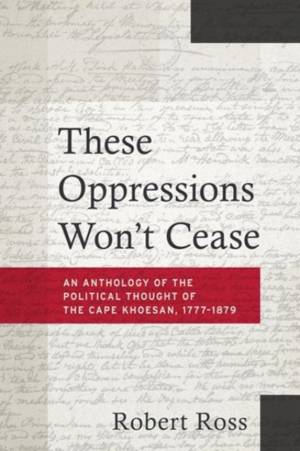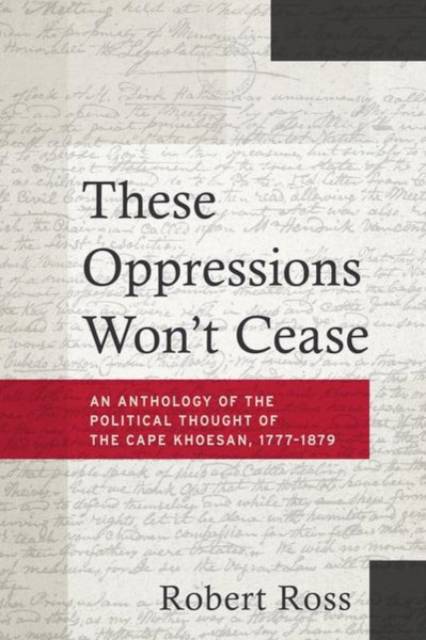
Bedankt voor het vertrouwen het afgelopen jaar! Om jou te bedanken bieden we GRATIS verzending (in België) aan op alles gedurende de hele maand januari.
- Afhalen na 1 uur in een winkel met voorraad
- In januari gratis thuislevering in België
- Ruim aanbod met 7 miljoen producten
Bedankt voor het vertrouwen het afgelopen jaar! Om jou te bedanken bieden we GRATIS verzending (in België) aan op alles gedurende de hele maand januari.
- Afhalen na 1 uur in een winkel met voorraad
- In januari gratis thuislevering in België
- Ruim aanbod met 7 miljoen producten
Zoeken
These Oppressions Won't Cease
An Anthology of the Political Thought of the Cape Khoesan, 1777-1879
Robert Ross
Paperback | Engels
€ 31,45
+ 62 punten
Omschrijving
The Khoesan were the first people in Africa to undergo the rigors of European colonization. By the early nineteenth century, they had largely been brought under colonial rule, dispossessed of their land and stock, and forced to work as laborers for farmers of European descent. Nevertheless, a portion of them were able to regain a degree of freedom and maintain their independence by taking refuge in the mission stations of the Western and Eastern Cape, most notably in the Kat River valley. Through petitions, speeches at meetings, letters to the newspapers and correspondence between themselves, the Cape Khoesan articulated a continuous critique of the oppressions of colonialism, always stressing the need for equality before the law, as well as their opposition to attempts to limit their freedom of movement through vagrancy legislation and related measures. This was accompanied by a well-grounded distrust of the British settlers in the Eastern Cape and a concomitant hope, rarely realized, in the benevolence of the British government in London. Comprising 98 texts, These Oppressions Won't Cease - was an utterance expressed by Willem Uithaalder, commander of Khoe rebel forces in the war of 1850-53 - contains the essential documents of Khoesan political thought in the nineteenth century.
Specificaties
Betrokkenen
- Auteur(s):
- Uitgeverij:
Inhoud
- Aantal bladzijden:
- 232
- Taal:
- Engels
Eigenschappen
- Productcode (EAN):
- 9781947602397
- Verschijningsdatum:
- 1/09/2018
- Uitvoering:
- Paperback
- Formaat:
- Trade paperback (VS)
- Afmetingen:
- 150 mm x 226 mm
- Gewicht:
- 362 g

Alleen bij Standaard Boekhandel
+ 62 punten op je klantenkaart van Standaard Boekhandel
Beoordelingen
We publiceren alleen reviews die voldoen aan de voorwaarden voor reviews. Bekijk onze voorwaarden voor reviews.









